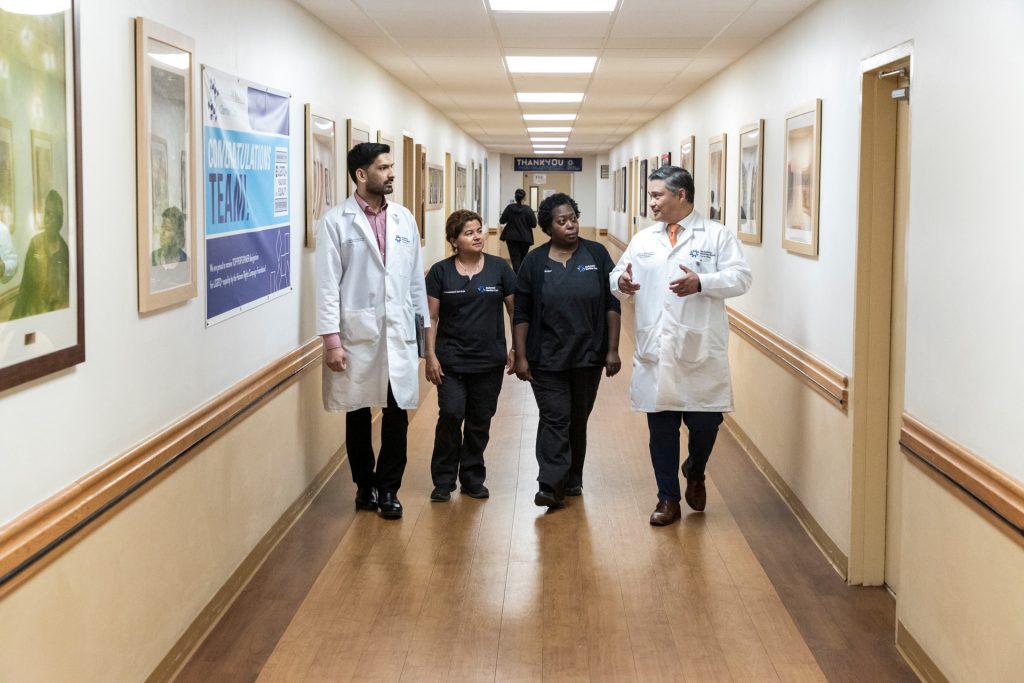AT A PIVOTAL MOMENT IN HISTORY FOR MENTAL HEALTH, HACKENSACK MERIDIAN HEALTH IS STEPPING UP, LEADING THE WAY IN ADVANCING CHANGE, EXPANDING CARE, AND PROVIDING HOPE FOR THE RESIDENTS OF NEW JERSEY AND BEYOND
BY AMANDA McCOY PHOTOS BY AMESSE PHOTOGRAPHY
In 1949, Mental Health America founder Clifford W. Beers successfully petitioned the United States government to designate May as Mental Health Awareness Month, in a gallant effort to educate his fellow Americans about mental illness and address the pervasive stigma surrounding the disease. It was a turning point for the millions of Americans affected by severe mental health-related conditions, such as post-war PTSD and psychosis, leading the way for more clinical research, government funding, and profound changes in understanding and attitudes.

Fast forward 75 years, and the nation has reached another critical moment in behavioral health, spurred by the COVID 19 pandemic, societal and political unrest, financial uncertainty, and the profound effects of social media that are only begin ning to be fully explored and understood.
Though the medical community has seen a tremendous amount of progress since the days of Beers’ advocacy, the work is far from over. Statistics estimate that 22% of adults (roughly 57 million) experienced a mental health-related disorder in 2023, and more than half did not receive medical treatment. Even more alarming, a staggering 80% of children with mental, emotional, or behavioral disorders did not receive care from a specialized mental health care provider, according to the Centers for Disease Control and Prevention. The pandemic only exacerbated an already swelling public health crisis, and medical leaders warn we still don’t fully understand its lasting impact.
At this year’s Politico Health Care Summit in Washington, D.C., Hackensack Meridian Health’s CEO, Bob Garrett, used the national spotlight to speak up about the urgency in responding to the growing (and historically under-prioritized) behavioral health epidemic, calling for “a mental health moonshot to write a new narrative for behavioral health care.”

“If we the medical community, insurance companies, and federal and state governments dedicate our collective time, energy, and resources to behavioral health, we can truly make a significant impact on the health and well-being of millions of Americans, now and for generations to come,” said Kenneth Esser, executive vice president of Behavioral Health Care Transformation Services at Hackensack Meridian Health, New Jersey’s largest and most comprehensive health care network. “Behavioral health has been a national challenge for the health care industry to embrace for a variety of reasons.
Reimbursement rates and insurance coverage for these services has been lagging, impacting the overall care model and ability to provide care as early as possible. That is changing as mental health is being addressed as an overall health priority. For the leader of a large health care network like Bob Garrett to firmly advocate that behavioral health become a national and societal imperative, that’s how we enact real change.”
Appointed EVP in January 2024, Esser’s greater vision for continuing to improve behavioral health care services at HMH is tri-fold: expand access to care, provide a larger scope of treatment options, and invest in specialized mental health care personnel. “Expanding access takes a lot of shapes and forms,” he added, noting it will also require a change in thinking for all players in the behavioral health services ecosystem. For HMH’s part, the network is growing its tele-psychiatry services, opened a mental health Urgent Care facility that offers low acuity treatment for anxiety and mood disorders, and expanding its current facilities, including a $24 million expansion at Carrier Behavioral Health at Raritan Bay Medical Center last year. In June, HMH will break ground on a new adolescent unit at Carrier Clinic, a state-of-the-art recovery center in Belle Mead that specializes in inpatient psychiatric treatment and rehabilitation for substance use disorder. With the pandemic causing a 24% and 31% surge in mental health-related emergency department visits for children ages 5-11 and 12-17, respectively, the initiative comes at a pivotal point in children’s mental health care.

“Post-COVID, there’s been an incredible need for inpatient services for younger children,” said Patricia Toole, president and chief hospital executive of the 114-year-old Carrier Clinic, the state’s largest dedicated behavioral health care facility. “Partnering with the state of New Jersey and the Cohen Foundation, we received two $5 million grants along with a $10 million donation from the Cohen Foundation to expand our adolescent unit. We are increasing our bed count from 36 to 50, and we’re building a new subunit for adolescent patients ages seven to 11. The new unit will be state of the art, offering a range of visual and touch sensory programs. We are examin ing all the different social drivers of care that impede the treatment of adolescents to provide the best treatment possible.”
“Mental health conditions and limited access to care were already at epidemic proportions before COVID,” added Eric Alcera, M.D., a child and adolescent psychiatrist and vice president and chief medical officer of Carrier Clinic. “The isolation, fear, and uncertainty surrounding COVID caused a pandemic within a pandemic for mental health, particularly for children and adolescents. There are not enough child psychia trists and not enough beds for kids. HMH had the foresight to commit to increasing capacity for children and adolescents even before COVID, and that says a lot about the organiza tion’s commitment to addressing mental health needs across the spectrum.”
Another pillar of HMH’s mission is the exploration of new, innovative, and previously underutilized treatment options. “A generation from now, our psychiatrists and psychologists will have a tool kit that’s three to four times larger than the one they have today,” added Esser, noting HMH is involved in several clinical trials and research initiatives to develop new models of care.

HMH recently partnered with biotech company Compass Pathways to conduct research on the effects of psychedelic therapy on certain mental health disorders, such as PTSD and severe treatment-resistant depression. “We’re only in the research phase,” noted Dr. Alcera, who still remembers the stigma attached to mental health care when he graduated medical school in 1999. “But the benefits could be momentous. It’s an exciting time in behavioral health medicine because these medical conditions are finally being addressed with the urgency and resources that led to unimaginable gains in cancer, heart disease, and neurosciences.”
As HMH invests in expanding its facilities and health care access, there’s a growing demand for specialized mental health care physicians and clinicians to meet the evolving needs of the patient community.
“In health care, it all starts with people, dedicated and trained professionals choosing behavioral health as their career path,” explained Esser. “This is not an area of medicine where we’ll see AI psychiatrists. Human connection empathy is a requirement. If we don’t have the proper staff to tackle the problem, we won’t be able to achieve our goals. We are especially proud of the HMH School of Medicine that is training mental health physicians, which is critical to meeting the needs of today and the future.”
Looking forward, Esser noted there’s still a long road ahead, and it will take a collective effort from providers, insurers, the community, and the government to move the needle forward. (Prior to joining HMH, Esser served as chief energy advisor for former Governor Jon Corzine, and his extensive background in government affairs lends him a special insight into the importance of advocacy to shape legislation).
“Society is evolving at an incredibly rapid rate never seen before, driven by a lot of factors, including social media, a 24/7 news cycle, and a culture of ‘nowness’ that is itself stressful [like ordering anything from a phone charger cord to a large-screen TV online for immediate delivery],” he said. “One thing that will never change is our commitment to behavioral health. We will always be innovating, making sure our care models are designed to best meet patients where they are. As the patient population evolves, we will evolve to deliver the most appropriate care in the most accessible way. Our goal is to ensure people receive care as early and conveniently as possible, which will help prevent emergency care visits from people in crisis.”
Carrier Clinic
252 County Road 601, Belle Mead / hackensackmeridianhealth.org/healthymind
Raritan Bay Medical Center
530 New Brunswick Avenue, Perth Amboy

